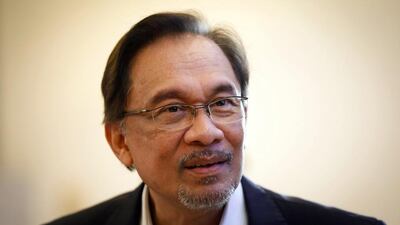In 2013, Malaysia’s opposition alliance Pakatan Rakyat (PKR), led by the veteran politician Anwar Ibrahim, came very close to winning the general election. It won the popular vote against the governing coalition, Barisan Nasional, which has been in power since independence in 1957, but lost in terms of parliamentary seats.
Today, Anwar will find out the judgment on his final appeal against his conviction and five-year jail term for sodomy. He is now 67, and if the guilty verdict is upheld, prison would probably mean the end of his political career. If the case strikes some as familiar, that is because Anwar, a former deputy prime minister with highly placed friends such as former US vice president Al Gore and deputy defence secretary Paul Wolfowitz, has been down this road before.
In 1998, after attempting to topple his mentor, then prime minister Dr Mahathir Mohamad, Anwar was detained to be put on trial for sodomy and corruption. The charges made headlines around the world, not least after Mr Gore praised Anwar’s supporters while attending the Asia Pacific Economic Cooperation forum in Kuala Lumpur, to the outrage of his hosts.
When Anwar subsequently went to prison in 2000, critics declared the charges to be trumped up. The alleged aim was to remove from politics a liberal reformer who was the greatest threat to what they said was an authoritarian regime. Whether he deserves that reputation is debatable, to say the least. He has resorted to unabashed and at times ugly populism. In 2010, he criticised the current prime minister, Najib Tun Razak, for employing a “Jewish-controlled” public relations firm, and warned, ludicrously, of “Zionist influence” in Malaysia. As for his zeal for reform, this was a cause he discovered only after serving for 15 years in the governing coalition as a minister and eventually deputy prime minister, until his falling out with Dr Mahathir.
Indeed, while in office he was accused of bribing his way to winning election as deputy president of his then party, UMNO. The holder of that position has, by tradition, become deputy prime minister. Nevertheless, since his release from prison in 2004, Anwar has led the opposition to strong showings in two general elections. His supporters allege that the current trial is an attempt to finish him off once and for all.
But the notion that prime minister Najib’s government has been behind Anwar’s never-ending judicial torment is vehemently denied and with good reason. The judiciary’s independence may have been tarnished during Dr Mahathir’s tenure, but times have changed and court decisions now frequently go against government figures. Moreover, Mr Najib is a progressive, western-educated pragmatist who has enacted key reforms, such as repealing the draconian Internal Security Act, which opposition figures had been demanding for years. He knows full well how poorly Anwar’s trials play internationally. Sources close to the prime minister have told me that they regard this verdict and appeal as a “lose-lose” situation for them, but insist that there is nothing they can do.
In this case, the police received a complaint from a young male employee who said Anwar had coerced him into nonconsensual sex. The justice system, government supporters argue, would have been negligent if it hadn’t investigated the allegation. If a prominent western politician was similarly accused, it is inconceivable that no action would be taken.
This trial has run since 2010, with Anwar first being acquitted, then convicted, and now awaiting the verdict on his appeal. Given the flip-flopping, if anyone was attempting to control the courts, they haven’t been very successful. If Anwar is released, that should finally put to bed the idea that the judiciary does whatever certain politicians tell it to.
Anwar will then have his own problems to deal with, chiefly the fact that the opposition alliance has never looked more shaky. His PKR party is liberal and primarily Malay but it is the weakest link. Far stronger are the Chinese Democratic Action Party (DAP) and the religious PAS. The DAP is social democratic and secular, and is vehemently opposed to PAS’s current attempt to introduce hudud, the Islamic penal system, in Kelantan, the eastern state that it runs. This could lead to the break up of the alliance and end Anwar’s hopes of office.
If he goes to jail, however, it could provide a fillip to the opposition by making a martyr of him. It would allow a younger figure to emerge. Many Malaysians are beginning to get Anwar fatigue as he has been de facto opposition leader since 1998. And it would distract attention from internal problems.
But whatever the lurid headlines, neither a guilty nor a non-guilty verdict will provide any justification for drawing any conclusions about the health of democracy in Malaysia. Anwar’s sexuality has been the subject of speculation for decades. The allegations have long been greeted with the comment “no smoke without fire”. The court will issue its determination on whether they have been proven or not and many Malaysians will breathe a sigh of relief that the episode is over. The whole country, both government and opposition supporters, can then finally move on.
Sholto Byrnes is a senior fellow at the Institute of Strategic and International Studies, Malaysia


